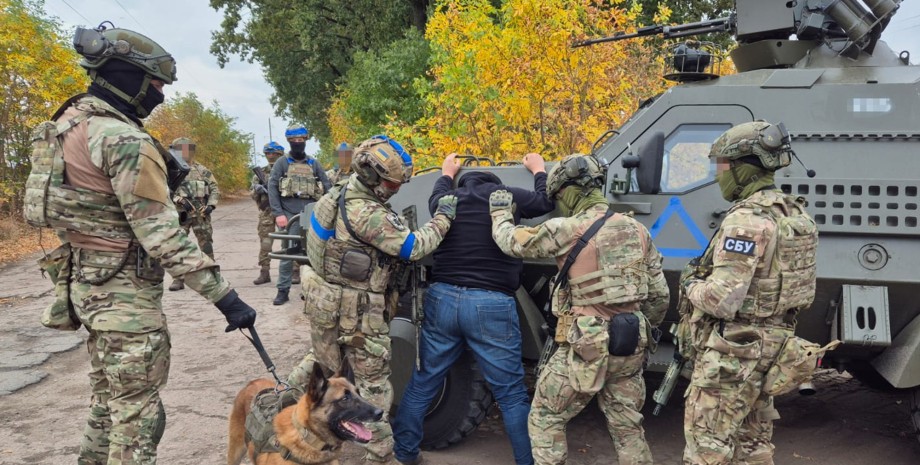
 By Natali Moss
By Natali Moss
Recently, the SBU detained the Russian agent, who was mobilized to the Armed Forces, a 30-year-old resident of Odessa, and the plans were to adjust the strikes of the Russian army in the unit. The Russian intelligence service has recruited it through Telegram channels, which houses fast earning posts. Initially, the person performed a "test task", and in August 2024, at the instructions of the Russian curator, he joined military service in one of the military units of the Armed Forces.
The priority goals of the enemy were training centers and points of deployment of the Air Force forces. Thanks to the data obtained, the occupiers wanted to hit when the facilities will have the greatest concentration of Ukrainian defenders. The man was reported suspected of treason, committed in the conditions of martial law. He is currently in custody, and he is threatened with life imprisonment with confiscation of property.
It should be noted that this is not the first case of the detection of Russian "moles" in the Ukrainian army. In the Dnipropetrovsk region, a man mobilized and spied on fighters on the Eastern Front at the task of curators from the Russian Federation. SBU employees detained the "mole" during an attempt to escape to Transnistria at the end of February 2024 through the border river. It is known that the suspect in the 2000s graduated from Moscow State University and received a lawyer diploma.
During his studies in Russia, he got into the field of view of military intelligence. The agent mobilized into one of the Armed Forces brigades and headed to Bakhmut. While in the frontline, Crete collected data on the places of basement and movement of Ukrainian troops. Another example is the detention in August 2024 by the military counterintelligence of the SBU of the FSB informant, which corrected the rocket-arable blow to the Donbass.
The contractor of one of the combat brigades of the Defense Forces of Ukraine transferred the coordinates of fire positions and military fortifications to the Russian special service. The curators were interested in the geolocation of the concentration of personnel and heavy weapons. "Crete" worked on the FSB through his father, who in August 2023 left for Russia: a large man crossed the border with the European Union and then went to the Russian Federation.
In Russia, he made contact with the propagandist and former FSB employee Sergei Karnaukhov. Denying information and introduction of agents is not only a problem of the Ukrainian army. The Russian military also suffer from "moles", but Ukrainian, says the former SBU employee and expert of the Ukrainian Institute of the Future Ivan Stupak. During the USSR, military counterintelligence authorities were established to monitor agent networks.
Prior to a full -scale war with Russia, this trend was not developed due to needlessness. Filtering agents at the stage of mobilization is impossible: people in the army need urgently, literally "in the day yesterday", so criminals are wanted after the fact, the expert notes. Some of the agents were recruited by the FSB in advance, others - directly during service in the Armed Forces.
The reasons for cooperation are very different: one disagrees with the conditions of service, the other has not been paid, the third did not give an increase and he expresses his work on the special services of the Russian Federation. Soldiers who cooperate with the FSB, as the Stupak clarifies, seem to be suspected of conversations, can be tracked by communication channels with curators. Suspicious money transactions are also established.
Methods of deception of agents are primitive: in Russia they can create a fictitious account in one of the banks and show the "drawn" statement of the account. Another common scheme is the minimum payments with subsequent blackmail. The agent is forced to work, otherwise all materials of the SBU will be transferred. The first execution of the task of the curators automatically contains the composition of the crime, for which the criminal term for the State Education is envisaged.
"There are moments when cards are recalculated by people in Ukraine. Reminds an informal financial and settlement system" Hawala ", which is used mainly in the Middle East, Africa and Asia. The person goes into the office, simply gives money, and in another The ends of the country receives them in another office, ”Stupak says. The responsibilities of military intelligence include monitoring messengers and hidden transactions.
Helps the search process and the Cybercrime Department of the SBU, he summed up. Focus earlier wrote in detail how Russian intelligence services are convinced by Ukrainian teenagers to set fire to cars belonging to the military. For the arson of the car, curators promise from 20 to 40 thousand hryvnias. At the beginning of October 2024, the SBU exposed a university teacher in Kharkiv, which corrected the strikes of Russian troops in the city.










All rights reserved IN-Ukraine.info - 2022